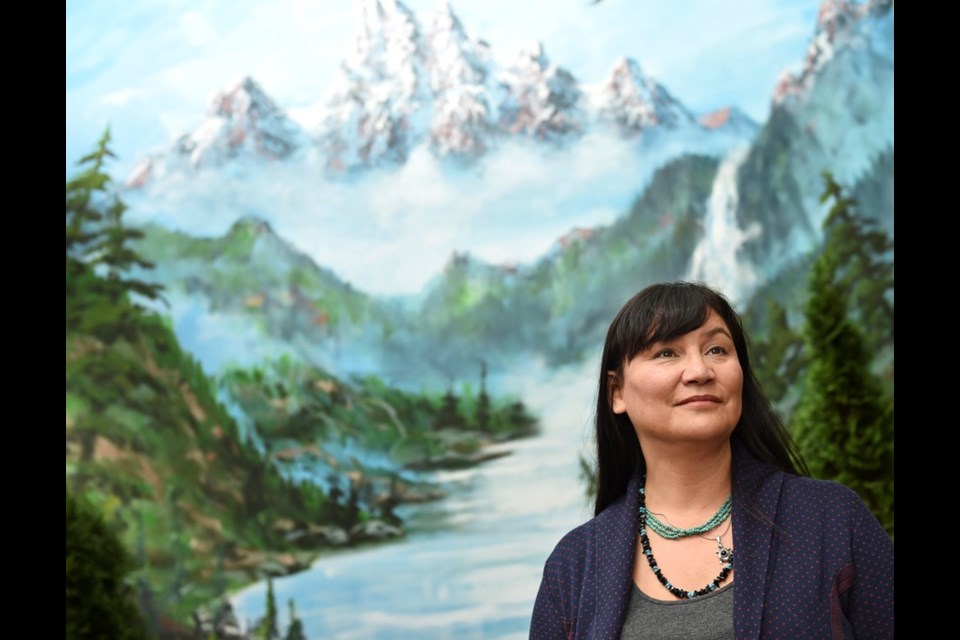A North Â鶹´«Ã½Ó³»Indigenous actress has stepped into a futuristic world in a lead role in a new science-fiction podcast inspiring hope.
The podcast explores the experiences of Canadian artists during the COVID-19 pandemic through a sci-fi story with Indigenous themes set in an 'Age of Symbiosis.'
The rather interesting concept was thought up by , a Vancouver-based indie company, as a way of creating new opportunities for performing artists in an industry devastated by the pandemic.
At the end of 2020 they commissioned 18 artists to create short digital works on their reflections on COVID-19, and then tasked their core creative team with imagining what would happen if these works were discovered 150 years in the future.
The result is podcast, which has just dropped on Spotify.
The experimental, futuristic story is told by an award-winning team of Canadian public radio veterans, Indigenous storytellers, opera and new music composers, and theatre-makers.
The podcast imagines a more organic future, where people are connected to the lands on which they live, and the performing arts are integral to the ways they communicate with one another.
The podcast is based in the year 2156. A young relic hunter, Phe, has just discovered an antiquated digital time capsule from the year 2020, the year of the first of the Great Pandemics. The young archivist is on a mushroom walk in the woods, experimenting with the piece of ancient digital tech when suddenly, it starts to transmit sound – voices from the past. Phe's fascination with the time capsule concerns mentor Lar, but they believe the voices of the past are hinting to a coming disaster.
“​This podcast aims to explore a hopeful view of the future on planet Earth,” said Paolo Pietropaolo, one of the podcast’s writers and a two time Prix Italia and Peabody award winner.
“It creates a conversation about our uncertain digital present and a more hopeful, more organic future​.”
North Â鶹´«Ã½Ó³»Indigenous actress plays a lead role
Renae Morriseau, a North Vancouver-based Cree actress, who is the voice of character Lar, an Elder and bio-engineer, said the project highlighted an important Indigenous world-view that “we are connected to our land.”
“There's a lot of teachings of Earth, of the relationship that we have with the Earth,” she said. “And, I think, that we all need to be able to understand our own place on the planet and what we give back to the Earth, and that was something, I think, rings true within this podcast.
“For people that are listening to the podcast, I hope they are tweaked to do some further research on what it means when we acknowledge the land.”
She said any art project that utilized an Indigenous world-view helped to break down the misconceptions that Canadians might have to climate change, reconciliation, and in understanding of who's in their community.
The podcast also offers an opportunity to hear the hÉ™nÌ“qÌ“É™minÌ“É™mÌ“ (Halkomelem) language of Musqueam Nation – which is spoken at times in the podcast.
Morriseau, who had to learn some of the language, said it was a rewarding challenge and a pleasure to work with Victor Guerin, who’s been involved in the revitalization of hÉ™nÌ“qÌ“É™minÌ“É™mÌ“ for almost 30 years.
“Utilizing the Halkomelem language … I thought really added a contemporary opportunity to hear the language.”
It’s the first podcast Morriseau, who usually works in theatre and Indigenous music, has been a part of.
She said it also encapsulated how artists had to adapt and modify their practices and reflects on how they felt when they could no longer do what they loved.
“There's a lot of opportunities for people to hear from these artists,” she said.
“I think it really encapsulates how artists are having to re define their voice, within this time that we're in right now.
“As we continue with these lockdowns and of course, with new COVID variants, a lot of people are feeling isolated and lonely. I think that, you know, we have a chance to have Canadian work that is responsive to what we're experiencing.
“I think that when people listen to the podcast, it will ring true on a number of fronts, in terms of looking to the future with a good eye and with hope. I hope they get some inspiration from the piece.”
The Apocrypha Chronicles ​ is free to download and releases weekly on Spotify, Apple Podcasts, Soundcloud, iTunes and Google Play.
Elisia Seeber is the North Shore News’ Indigenous and civic affairs reporter. This reporting beat is made possible by the .



